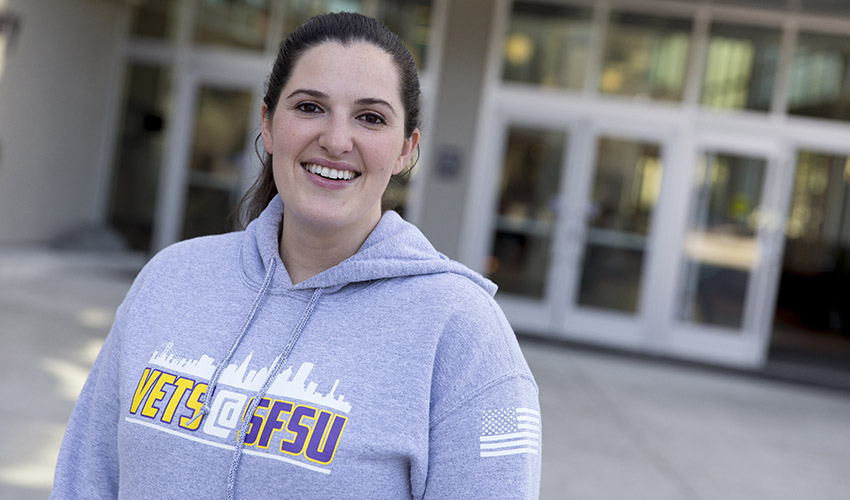SF State veterans dispel myths about military stereotypes

Elizabeth (Lizz) Lauren Mayhill is an Air Force veteran and civil engineering major who also holds a work-study job in the Veterans Services office.
As Americans observe Veterans Day on Nov. 11, San Francisco State University celebrates the five-year anniversary of its Veterans Services office and the three-year anniversary of the Vets Corner, a suite of rooms in Burk Hall where all are welcome -- veteran or civilian -- to socialize, connect with vets or use the quiet study room equipped with computers and whiteboards.
Veterans on campus took time in the weeks leading up to Veterans Day to discuss some stereotypes and assumptions about the military that they've encountered during their daily interactions on campus and in civilian life. Below they share their experiences.
Myth #1 -- San Francisco is inhospitable to veterans.
According to Marine veteran and mechanical engineering student Sean Scharf, "There's a belief throughout the military community that San Francisco is not welcoming to veterans. This is based on images of San Francisco in the media of being liberal, … But in fact there's a real sense of community here -- it's a very welcoming place. "
That holds particularly true on campus, said Scharf, who is also the president of the V.E.T.S.@SFSU student organization and holds a work-study position in the Veterans Services office. The office provides a range of vital services for veterans and their dependents as they make the transition from military to civilian life, including helping with applications, explaining benefits, finding internships, serving as academic advisors and providing education about other services on and off campus.
Ben Yang, Veteran Services coordinator, said that in 2015 the center served 419 veterans, a 30 percent increase since it opened in 2010. It also provided assistance to 760 veteran dependents, an increase of nearly 44 percent since 2010, he added.
Myth #2 -- Veterans don't want to talk about their life in the military.
"The military and veteran cultures sometimes feel alien to other people on campus. I get the sense that civilians think, 'I don't want to intrude,'" said Scharf. "But that's the reason we're out of the military -- we want to get back into the civilian mindset and get involved."
Scharf said one of his main goals as president of V.E.T.S.@SFSU is to reach out to other organizations on campus and become more involved in campus activities. For example, he wants more students to drop by Vets Corner, whether or not they are veterans.
Myth #3 -- Everyone in the military is a "big and macho guy" in uniform who uses a lot of jargon.
Elizabeth (Lizz) Lauren Mayhill is an Air Force veteran and civil engineering major who also holds a work-study job in the Veterans Services office. "I always had a stereotype of what a military member was. I always thought it was a guy in uniform who's big and macho and uses a lot of slang terms and jargon," she said. "Then my sister joined the military and I realized she wasn't like that and my perceptions began to change. When I joined the military, a female cadre [similar to a drill sergeant] told me, 'I'm never going to tell you that you can't do something because you're a woman, and don't ever tell me I can't do something because I'm a woman.' She was a huge advocate for women in infantry, and still is, and she became a mentor. She showed me the importance of strong female roles and teamwork."
Myth #4 -- Veterans are aggressive or always trying to recruit other students to join the military.
Simply not true, according to Mayhill. "Although I am extremely proud of my service and the time I dedicated to it, I embrace the fact that everyone takes a different path in life. Our training also provides us with tools to use in combat. However, every veteran swore to defend the U.S. when joining, so the myth about aggression towards fellow Americans just isn't so," she said.
Myth #5 -- All veterans are somehow wounded and want to be thanked for their service.
"People tend to see a veteran and make 'veteran' analogous to 'wounded,' as if we're all wounded warriors. The truth is, military service is not easy. War service is extremely hard, and for those who have been in combat, it is even more arduous to be sure," said Professor Daniel Bernardi, interim dean of the College of Liberal & Creative Arts and a U.S. Navy Commander. "People who have seen combat understand -- it's profound. That doesn't mean we're wounded.
"When someone thanks me for my service, it's a sign of kindness from them -- I get it," Bernardi continued. "But it's a reminder that we might be perceived as different. What a veteran wants is to be respected for their choice of serving but not to be made different because of that choice."